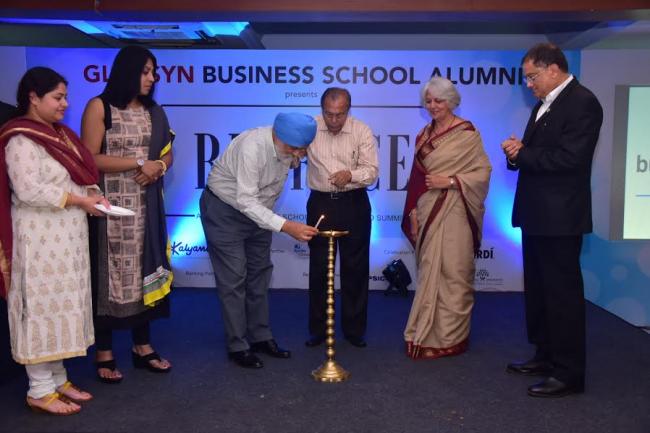16 Aug 2016, 06:21 am

Called RETRACE, the Summit – organised at the Lake Land Country Club – not only aimed to bring together the alumni but also to bring together the alumni, entrepreneurs and corporates to deliberate on future plans for Globsyn Alumni Engage Initiative.
.jpg) He highlighted that digitalisation is an inescapable feature today; for example, app-based functions are becoming increasingly popular in India and entering into almost every sphere of life, from mobile banking to local transportation.
He highlighted that digitalisation is an inescapable feature today; for example, app-based functions are becoming increasingly popular in India and entering into almost every sphere of life, from mobile banking to local transportation..jpg) Strengthening basic education in the country is very important, he said, “because if a person is not able to follow the instructions in a manual, how will he or she, work?”
Strengthening basic education in the country is very important, he said, “because if a person is not able to follow the instructions in a manual, how will he or she, work?”- ‘This Union budget is about building capacity, not chasing short-term consumption’
- AI will replace surgeons, coders — and billions of jobs, warns Sraddhalu Ranade at MCHD-SKC Memorial Lecture
- Religion without servility: Journalist Anshul Chaturvedi on why Vivekananda speaks to believers and atheists alike
- Culturist Sundeep Bhutoria unveils anthology When Gods Don't Matter at Jaipur LitFest 2026
- Kolkata CP urges elderly to stay alert against digital scams at ‘Pronam’ interaction
- Sona Incubations, Salem picks 17 startups for Rs 11 Mn DST investment, grant
- Visva-Bharati University unveils a transformational roadmap under Vice-Chancellor Dr. Probir Kumar Ghosh
- Sona College of Technology hosts Think Salem 2025: To spur startup opportunity from Tier-2 Cities
- ACM India unveils National AI Olympiad 2026 to spot school talent for global AI stage
- Reject Macaulayan education, reclaim Indian values: H M Bangur’s big World Hindu Economic Forum pitch
Gurgaon : Air India, India’s leading global airline, has unveiled a completely refreshed beverage collection, one that brings together some of the world’s most celebrated wines and spirits at 35,000 feet on international routes.
Indian airline major Air India today announced a significant enhancement to its popular Mumbai-Frankfurt route, with the deployment of its newly delivered, first line-fit (or made-for-Air India)
Saudia, the national flag carrier of Saudi Arabia, and Air India, India’s leading global airline, have signed a codeshare agreement that will take effect in February.





